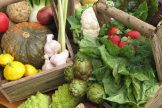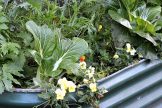
It can be tricky setting up a productive garden when you don’t own your own place. However it’s certainly not impossible – so if you rent and you’re dreaming of a bountiful yard full of homegrown produce, here are some tips on how to go about it.
So how will your landlord or real estate agent feel about you making a garden at the property? If you’ve scored an accommodating landlord – get planting! Otherwise you could offer general maintenance of any existing gardens and lawn, in return for creating a couple of new beds for your produce. If your landlord doesn’t come to the party, or you have a balcony or small space to grow in, you need to grow your produce in a ‘pack up and away’ style.
The Mobile Garden
The big thing when you’re constructing a food garden at a rental property is to do it with deconstruction in mind – so raised beds and pots are excellent. Even if you’ve got the all clear to set up a garden, you don’t want to be planting all your garden budget in someone else’s ground then leave it behind when you move.
Similarly, if your landlord isn’t keen, you’ll need to be able to pack everything up and get it out when you go. If you leave things like garden beds, borders, plants, compost or structures at the property once you’ve vacated, you could lose part or all of your bond for “cleaning expenses” or “damage”.
Raised Beds
Raised garden beds are a winner for renting. If you can get your hands on a corrugated tin raised bed – awesome. If you’re on a tight budget, things like old bricks, sleepers, planks of wood (watch out for old paint and nails though), stakes and mesh, anything that will hold in the dirt, is good. My favourite way to grow spuds when renting is in an old hessian bag. Those big woven bags that advanced trees are sold in are ace too.
Pots
Pots are fantastic for growing produce when you’re renting. I’m not talking about fancy expensive ceramic pots either – ask your local nursery or garden centre if they have a plastic pot recycling bin, or pots they want to get rid of. We have a plastic pot recycling bin in the driveway here at BAAG, and you are welcome to help yourself! (just make sure you wash them thoroughly before use).
Polystyrene boxes are a favourite of mine for growing things. Your local market will have lots to give away.
Produce and fruit can be grown in pots of all sizes: the bonus is they can be moved around your yard/balcony as the seasons change, and then emptied or taken with you when you move.
Try lettuce and rocket (or “daily pickings”) in pots at the door nearest your kitchen; longer seasonal veg like tomatoes or cauliflower in poly boxes in the backyard, beans and peas in a pot climbing up a bit of trellis or the fence, and dwarf fruit trees or citrus underplanted with herbs in bigger pots.
Unused backyard concrete paths or driveways are also a great spot for pots and boxes; it’s a good space saver, and the concrete holds the sun’s heat, transferring warmth to the soil in your boxes.
Space Savers
Most rental properties, especially in big cities, will have a small yard to work with. This doesn’t mean you can’t go nuts with your produce, you just need to utilise every bit of space. Ask your landlord if they wouldn’t mind you planting perennial herbs on the nature strip. Get creative and think vertical – use the shed roof to grow your pumpkins, grow beans up the clothesline, plant your strawberries in hanging baskets, raise your seedlings on the windowsill.
Doing it on a Budget
When you rent you often don’t have buckets of money to blow on gardening – but you don’t need to!
Try to keep the amount of things you plant in the ground to a minimum.
Reduce the amount of product you bring in: make your own compost (bokashi buckets for apartments, compost bins or construct your own for backyards), and make weed or manure tea for fertiliser.
Keep your eye on hard rubbish for stakes, bricks, pots, netting, wooden pallets, trellis etc.
Look for the bargain sections at nurseries.
Plant seeds instead of seedlings; join a gardening group, community garden, or vegie swap and swap seedlings, cuttings, and excess produce.
Just stick to the ‘leave it as you found it’ rule and enjoy!





